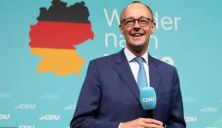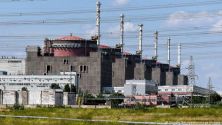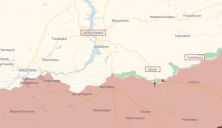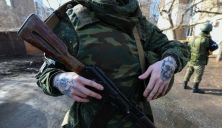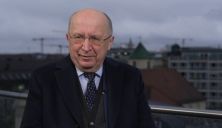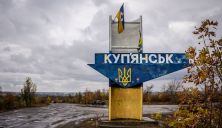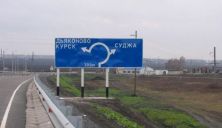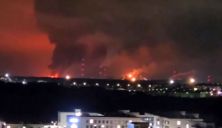Thank you. I see that I am the old man of the tribe, no? Certainly, I am a man, and I am much older than my counterparts. Well, I am happy to be the old man in the tribe because certainly, I have more experience. And my experience says that the future is unpredictable, which is not very original.
But one year ago, we were in Kabul. Everybody was thinking and working – remember? It was just one year ago – on Afghanistan. Who could have imagined one year ago that now we would be very worried about what is happening in Ukraine? And everybody seems to have forgotten about Afghanistan. Nobody talks about Afghanistan. Does Afghanistan still exist? Yes, it exists and Afghan people, in particular Afghan women are suffering a lot – but there are no news about it. It looks like in our civilisation and our democracies, we are able to take care of one crisis at a time – just one, and one after the other but not several at the same time. There is no room in the headlines of the newspapers to talk at the same time about Afghanistan and Ukraine. And by the way, what is happening in Afghanistan?
I am afraid that since it continues like this, who knows what is going to happen next year? But today, everyone is thinking, everyone is looking at what is happening in Ukraine. I want to say that we have to continue supporting the Ukrainian people. [Vladimir] Putin could not imagine that six months after starting the war, he would be in a weaker position – I would not say retreating but in a defensive position. And certainly, I have to encourage you to support Ukraine.
I am not going to say how courageous they are and how heroic is [Volodymyr] Zelenskyy because they do not need to be praised, they need support. They do not need applause, they need arms. And we are providing arms and we have to continue doing that. We sanctioned the Russian economy and we have to continue doing that. And it comes with a price.
And you, young people, you will have to explain to the older people that: yes, we have to be ready to pay this price. And the price comes, with higher electricity prices, with high prices of almost everything, and with the social turmoil. And Putin is waiting for us to get tired. Putin knows that democracies are “states of opinions”, and the opinions will be controversial, and when people will have suffered a lot, they will say: “Okay, stop it, stop this war”. People will have to balance their own pain, with the pain of the Ukrainians. And certainly, for everybody, your own pain is more important. But Putin is expecting the democracies to get tired of supporting Ukraine, and we have to show that we care, that it matters, and that we will be supporting Ukrainians hard as far as they needs. And I am sorry to say, the fight will continue.
Here, in the European Union, we have been showing unity more than ever, quicker than ever. I never expected us to be so quick, so strong, in supporting Ukraine. Breaking taboos, mobilising financial resources, mobilising the capacities of our armies – not to participate directly in the fight, otherwise it would the third world war. I remember, in January, I went to visit the Donbass frontline, and the Prime Minister of Ukraine [Denys Shmyhal] told me: “When the Russians attack – because they will attack -, I do not expect European soldiers to come and to fight with us, but at least, I expect you to provide us with the arms to defend ourselves”. That is what we are doing. So, this is my own encouragement for you to support Ukraine and all my immense admiration for the people in Ukraine for fighting the way they are doing.
But Ukraine is not the only crisis. Sahel is also a problem. Some days ago, the last French soldier left Mali – by the way, the same day that one year before the last American soldier left Kabul. It looks like the West is strategically shrinking and losing positions. In the case of Africa certainly, we are shrinking, and Russia is taking our place.
We have the negotiations about the nuclear deal, brokered with the US. I hope that we can restore the deal.
We have the Kosovo-Serbia [EU-facilitated dialogue], with good news today. From time to time, there is good news. We have reached an agreement in order to avoid the next crisis.
We are in crisis prevention mode. We have the Tigray, that does not exist until something very extraordinary happens. We have Myanmar – you can choose between the crises.
But the big crisis is the triple crisis of financial crisis, energy crisis and food crisis. These three elements together will affect millions of people. The World Food Programme says that the index of food is at the highest price – 40% more expensive than two years ago. And for us, that we spend 15% of our budget for food, it is important. But if in your budget food represented 50%, then this 40% increase would be much more difficult. There are tens of millions of people, mainly in Africa, in a very dire situation because they cannot pay the higher prices for electricity – well electricity, some of them, they have never seen a lightbulb – energy, food and the financial crisis, which is blooming.
And there is a competition in the energy market. We, Europeans, can pay higher prices for gas because we can afford it. They cannot afford it and they blame us for taking the gas that otherwise would be used for them. And we take this gas because there is no Russian gas. Everything is connected around the world. But yes, this tsunami of this triple crisis in the next month, you will see, we will have to be very – not just worried – but taking care of what we can do, and we can do a lot of things.
Then, there is China emerging. China is unavoidably the next big power. What China has done in the last 40-50 years, it has never happened before in the history of mankind. It is an extraordinary success from the point of view of getting people out of poverty and developing a country which is now at the forefront of technology, economic growth, and is selling its political model. So, there is a battle of narrative on which model works best in order to satisfy the needs of the people – not only the political needs, not only to be able to choose your government which is quite important, but also from the point of view of economic well-being.
You are Europeans, we are Europeans, we are very lucky. We are the luckiest people in the world because nowhere in the world, political freedom, economic prosperity and social cohesion has been achieved – the three things – as much as in Europe. These three things at the same time. You will not find anywhere in the world, a place in which to be free, to have economic prosperity and well-being, and social protection as much as we do. I am not saying that it is perfect, certainly not. And 20% of the European population lives below the line of poverty. But nowhere else, the humankind has been able to create a model of political freedom, economic prosperity and social protection as we have done. And that is why people want to come to live in Europe. They do not want to migrate to Russia, they want to migrate here.
Third, what is our response to this troubled world? With China emerging, with a lot of crises everywhere, with this triple crisis looming. I think that Europeans, we should be less naïve to have a better understanding of the world that way it is. Because we believed that trading, creating economic interdependencies, and preaching the rule of law and human rights would be enough. And it has been a lot, but certainly not enough. We live in a world of power politics, we live in a world of the former empires. People who were an empire, centuries ago, want to become an empire again. This is the case of Russia, this is the case of China. We can say something about Turkey also, an old empire who comes and says, “I am a power. I want to play a regional, political important role”. And dependencies have become dangerous. Too much dependency becomes dangerous because you are weak, and because the other can abuse you.
When the pandemic came, we discovered that in Europe we were not producing a single gram of paracetamol – not a gram of paracetamol. The biggest pharma industry in the world had been sending to India – and to other countries – the production of a basic product because we believed that the market will provide it. If there is an increasing demand, the market will produce more, it does not matter where. We are global, no? Well, the market will provide unless there is a crisis, and when there is a crisis, the market does not provide. And dependency is becoming a weapon. We have created a dependency on the Russian gas which now, seeing in perspective, seeing the last 20 years, it is difficult to imagine how this has happened. How we could imagine that Putin was a reliable supplier of energy, putting 40% of our supplies of gas into Russian hands.
Dependency is a weapon. Everything becomes a weapon. The weapons are not just tanks and cannons. The weapons are everything in which you can be affected by a power decision by someone else. So, we have to be more united. Tell, please, to Europeans, young and old: we are too small, we are only 5% of the world population. After the Second World War, we were 20% of the world population. It has been shrinking to 5% of the world population. You do not feel very enthusiastic about producing babies, and that is why we are old. That is why we are old because we do not reproduce ourselves. And when a human group of people does not reproduce themselves, it is because they have a problem with the future. Because you reproduce yourself in order to continue building the future. So, we are 5% of the world population, we are twice older than the people South from Gibraltar to the Caucasus and we are energy dependent. That is not a good recipe for the future – talking about the future.
So, we have to understand the world the way it this. We have to understand that we are very powerful because we have accumulated technological, economic, and social capital more than anyone else. And we have to use this power in order to exist in the world. The European Union was created to solve intra-European problems, problems among us – the Germans and the French killing each other. That has not happened for the last 70 years – big news. But now, the problem is not among us, it is with the rest of the world, with the 95% of human beings who are not Europeans, and they would like to live like we live.
And some of them tell us: “Look, you live so well because, you know, have you heard about colonialism? Have you heard about imperialism? Have you heard about slavery?” This is part of our history also. So, we have a duty to the rest of the world, and we have to engage with the rest of the world. We will not be able to build walls along our borders high enough in order to defend ourselves from the rest of the world. We will not be the garden in the middle of the jungle. We will not be the fancy garden in the middle of the jungle, and the jungle is growing.
Take your responsibility, push for governments who want to build a united Europe because if we do not unite, we will not survive – as easy as this. 5% of the world population divided in 27 pieces with 27 armies is not fit for the 21st century. You know that altogether we have a double number of soldiers than the US and more than China, but are we considered a military power? We know that all together, we spend in arms four times what Russia spends. I would not say that the 27 European armies all together have the same fire capacity than the Russian army.
So, take the responsibility. Support people who want the Europeans to work together, to get united. And take the responsibility towards the rest of the world because the rest of the world demands more of a European role. Every time that I am travelling, everywhere in the world, people tell me “Last time that we saw a European authority was ten years ago. We need you, we do not want the world to be this bipolar between China and the US. We do not want a new Cold War. We need Europe. Europeans need Europe and the world needs Europe, so build it.
Thank you.
